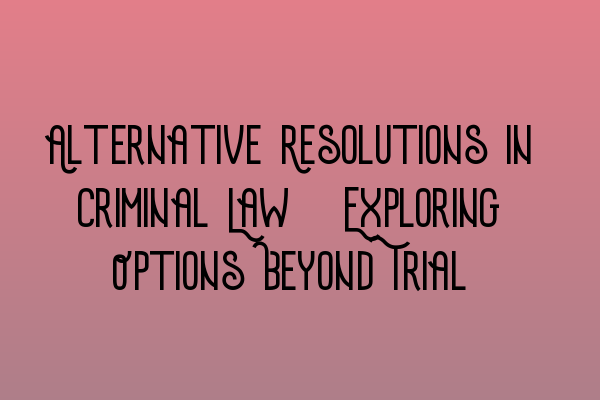Alternative Resolutions in Criminal Law: Exploring Options Beyond Trial
At SQE Criminal Law & Practice Law UK, we understand the importance of exploring alternative resolutions in criminal law cases. While trials are essential for a fair and just legal system, they are not always the most efficient or effective way to resolve a case. In this blog post, we will discuss various alternative resolutions in criminal law and the benefits they offer.
1. Plea Bargaining
Plea bargaining can be a viable alternative to trial in many criminal cases. It involves negotiation between the prosecution and defense to reach an agreement on a lesser charge or reduced sentence in exchange for the defendant’s guilty plea. Plea bargaining can expedite the resolution of a case, reduce court congestion, and provide potential benefits for both parties involved.
2. Diversion Programs
Diversion programs offer an alternative resolution for certain types of offenses, particularly non-violent crimes committed by first-time offenders. These programs aim to address the underlying issues that led to criminal behavior and provide educational or rehabilitative interventions instead of traditional punishment. By participating in diversion programs, individuals can avoid criminal convictions and have an opportunity to turn their lives around.
3. Mediation and Arbitration
Mediation and arbitration are alternative dispute resolution methods commonly used in civil law, but they can also be adapted for criminal cases. Mediation involves a neutral mediator facilitating communication and negotiation between the parties, while arbitration is a more formal process in which an arbitrator makes a binding decision. These methods can help resolve conflicts, promote reconciliation, and provide more control over the outcome for the parties involved.
4. Restorative Justice
Restorative justice focuses on repairing the harm caused by criminal actions through dialogue, accountability, and reconciliation between the victim, offender, and the community. This alternative resolution aims to meet the needs of all parties involved and address the underlying causes of crime. Restorative justice can bring closure to victims, facilitate offender rehabilitation, and promote community healing.
5. Deferred Prosecution Agreements
Deferred prosecution agreements (DPAs) are formal arrangements between the prosecution and the defendant in which the prosecution agrees to suspend criminal proceedings for a specified period. The defendant must fulfill certain conditions, such as restitution or compliance with specific requirements, during this period. DPAs provide an opportunity for rehabilitation and allow individuals to avoid the stigma and consequences of a criminal conviction if they comply with the agreed-upon terms.
Conclusion
Exploring alternative resolutions in criminal law can offer cost-effective, efficient, and fair outcomes for both defendants and the justice system as a whole. Plea bargaining, diversion programs, mediation and arbitration, restorative justice, and deferred prosecution agreements are just a few examples of the options available. If you or someone you know is facing criminal charges, it is important to consult with an experienced criminal law solicitor to determine the most suitable alternative resolution strategy.
Related Articles:
- SQE 1 Practice Exam Questions
- SQE 1 Practice Mocks FLK1 FLK2
- SQE 2 Preparation Courses
- SQE 1 Preparation Courses
- SRA SQE Exam Dates
